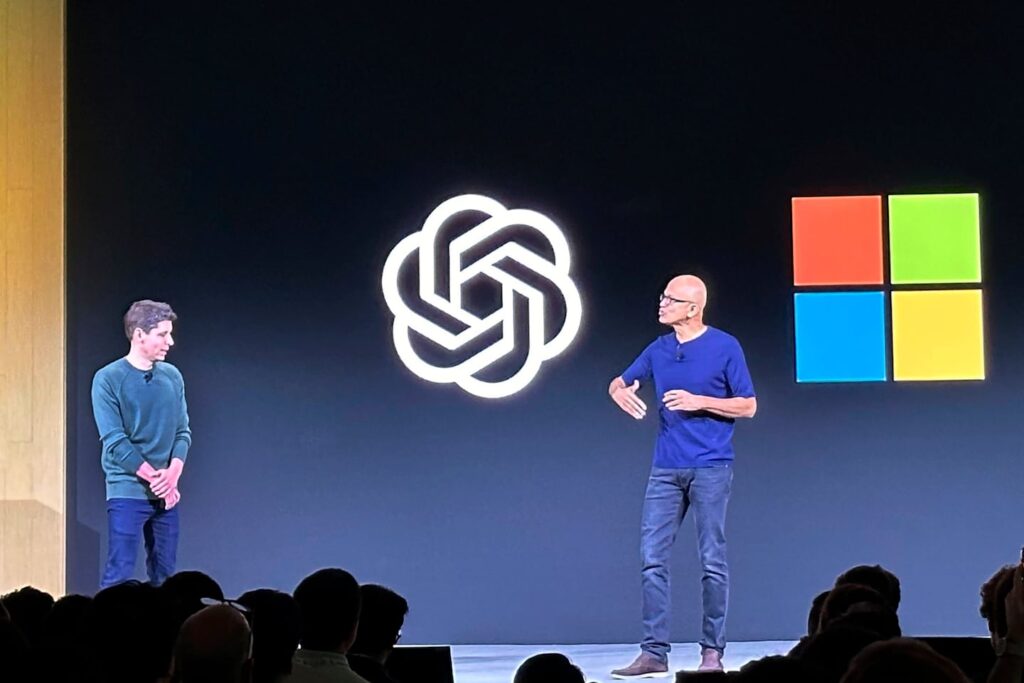Microsoft and Apple, OpenAI’s two biggest partners in developing ChatGPT, will no longer have advisory roles on the company’s board of directors as U.S. and European governments scrutinize the power big tech companies have over leading artificial intelligence startups.
Microsoft, which has invested billions in OpenAI, received a non-voting seat on the company’s board after a dramatic board shakeup last year saw CEO Sam Altman fired, then reinstated days later. Apple also planned to take on an advisory board role after striking a deal to integrate ChatGPT into its products, Bloomberg News reported last month, but such plans will not go ahead. OpenAI confirmed that it will no longer have an advisory board seat on the company’s board.
A Microsoft spokesman confirmed the company was stepping down from its board of directors. An Apple spokesman did not respond to a request for comment. The resignations were first reported by the Financial Times.
Since its most prominent partners haven’t been given formal board positions, OpenAI plans to meet regularly with key investors and partners, including Apple and Microsoft, OpenAI spokeswoman Kayla Wood said in an email. “We look forward to continuing to receive feedback and advice from these key stakeholders.”
Spurred by interest in ChatGPT and other chatbots, the rise of AI startups including OpenAI and Anthropic has shaken up the tech industry in the last year, with analysts and tech leaders suggesting these new entrants could take some of the power away from established companies like Microsoft.
Get caught up in
Stories to keep you up to date
But OpenAI and other major AI startups have come to rely on investment from big tech companies because of the enormous costs of developing cutting-edge AI: The algorithms behind systems like ChatGPT are trained using expensive, power-hungry computer hardware.
Microsoft is investing billions of dollars in OpenAI in early 2023, while Anthropik also received funding from Google and Amazon last year, but those deals have drawn regulators’ attention. (Amazon founder Jeff Bezos owns The Washington Post.)
In January, the Federal Trade Commission announced it would investigate whether investments and partnerships between AI companies and big tech companies are harming true competition. “Our investigation will shed light on whether investments and partnerships pursued by dominant companies pose risks distorting innovation and undermining fair competition,” FTC Chairman Lina Khan said in a statement at the time.
Last month, Khan’s agency reached an agreement with the Department of Justice that lays the groundwork for the FTC to investigate Microsoft’s partnership with OpenAI.
Microsoft giving up its formal role on OpenAI’s board of directors likely won’t allay the FTC’s concerns about the relationship between the two companies, according to a person familiar with the matter who spoke on condition of anonymity to discuss private matters. The move suggests the companies know the deal could raise “serious” antitrust issues, the person said.
OpenAI has been rapidly hiring lawyers and lobbyists as it grows and faces mounting legal and regulatory pressure. The company faces a growing number of lawsuits from news organizations, authors and other content creators who claim the company used their copyrighted works to train its AI algorithms without compensation or permission.
Though OpenAI is well-known, it’s still in its infancy and needs to attract more customers to turn a profit. Partnering with a major tech company gives AI startups access to billions of paying customers around the world, which is an easier path than building a new product from scratch.
OpenAI and Apple have positioned their recent agreement as mutually beneficial, with Apple providing access to ChatGPT to enhance iPhone capabilities and bringing OpenAI’s technology to users of Apple phones and computers.
Microsoft’s advisory role on OpenAI’s board was announced after a dramatic showdown at the company’s board meeting in November. Most of the company’s former board members voted to fire Altman, a move that drew anger and shock from the tech industry and prompted threats from many of the company’s employees to quit. Altman was reinstated a few days later, leading to the resignation of nearly the entire board.



